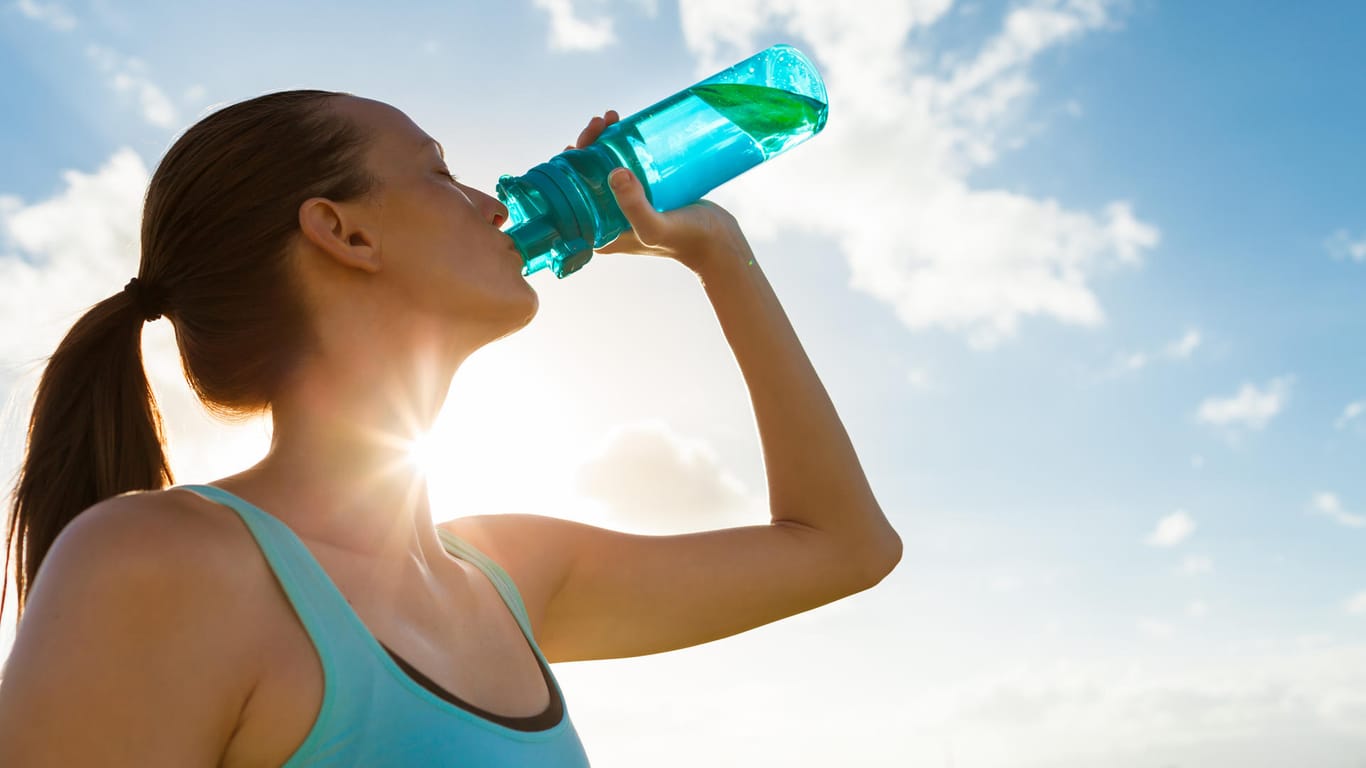 You shouldn’t drink less than a liter a day (Source: Thinkstock by Getty-Images-bilder)
You shouldn’t drink less than a liter a day (Source: Thinkstock by Getty-Images-bilder)
The worry of not drinking enough is a constant companion for many. 1.5 liter bottles, drinking apps and notes on the computer should help to ensure adequate fluid intake. But does our body really need two liters a day? Five drinking myths put to the test.
Everyone agrees that drinking is healthy. The body consists of 50 percent water, so adequate fluid intake is important. But some people spend half the day with their mouth on the water bottle – regardless of whether they are thirsty or not. Does this make sense?
Myth one: Two liters of water a day is mandatory
Australian study author Michael Farrell and his team from Monash University in Melbourne recently addressed exactly this question . The result of the study, which was published in the journal “Proceedings of the National Academy of Sciences (PNAS)”: You should listen to your feeling of thirst and only drink when you are thirsty. The body signals in good time when it needs fluid replenishment. According to the scientists, living according to a strict drinking plan or even forcing yourself to drink is not advisable. If you don’t get two liters a day, there’s no reason to worry, according to the researchers.
The German Society for Nutrition (DGE) also sees it that way and also advises listening to your feeling of thirst. However, according to nutrition experts, you shouldn’t drink less than a liter a day. Water fulfills important functions in the body, transporting nutrients and breakdown products and regulating body temperature. Our body also loses water through sweating , breathing and the kidneys. The DGE’s tip: Drink a large glass of water with every meal .
Myth two: Drinking with food dilutes digestive juices
Another myth is that consuming additional fluids with food dilutes the digestive juices. On the one hand, the gastric juice is extremely acidic and the effect cannot be easily influenced. On the other hand, the stomach adjusts the amount of acid if necessary. A glass of water with a meal therefore has no negative impact on digestion . On the contrary: warm water can even stimulate intestinal activity. Drinked after getting up, it helps many people go to the toilet in the morning.
Myth three: Coffee doesn’t count towards your fluid balance
The fact that coffee should not be counted as part of your daily fluid intake is also a myth and is not true. According to the DGE, coffee as well as black and green tea can be treated like any other drink in the fluid balance because they also contain water. According to the experts, there is nothing wrong with three to four cups. However, the drinks are primarily stimulants and not thirst quenchers.
By the way: If the amount of fluid isn’t right, the body sends clear signals. Tension headaches, declining concentration, tiredness, constipation and dark yellow urine, for example, indicate too little water in the organism.
Myth four: If you drink water, you will lose weight
Convinced people who want to lose weight argue that it is minus calories that make the fat melt and they boldly reach for a cold glass of water. But it’s not quite like that. The amount of energy the body uses to bring the water to body temperature is not worth mentioning. The positive effect lies elsewhere. The water itself does not make us lose weight, but rather helps us save calories. You will feel full faster if you drink a glass of water before eating. Hunger and thirst are often confused. If you drink a glass of water first when you have a craving, you have a good chance that the cravings will subside and the chocolate bar will stay in the drawer.
Myth five: Tap water has no minerals
Tap water does not contain any minerals – this myth also persists. A study by Stiftung Warentest shows that this is not the case . The testers found that most bottled water from the supermarket does not contain any more minerals than tap water. Only every fifth water showed a high or very high content of magnesium, sodium and other minerals.
The term water hardness in relation to tap water essentially describes the calcium and magnesium content. Hard water is in no way harmful to health, as the Federal Environment Agency (UBA) emphasizes in its guide “All about drinking water”. However, if you wanted to cover your mineral needs through drinking water alone, you would have to drink about a bucket of water, according to environmental experts. 100 grams of Emmentaler have the same effect. What people need most from drinking water is the water itself
Allow tap water to drain briefly
In order to obtain the best possible quality from the tap, the UBA advises that drinking water that has been in the tap for four hours or longer should be drained briefly until it runs a little cooler over your fingers. Only then will it return to its optimal quality. The drained water can be used for other purposes, such as cleaning or watering flowers.
Attention heart patients
Patients with heart failure must drink enough water in hot weather. At the same time, there should not be too much fluid, warns the German Heart Foundation . This can also weaken cardiac performance. How do patients know if they are drinking enough but not too much? The Heart Foundation recommends getting on the scales in the morning and evening. If someone weighs more than 500 grams more in the evening than in the morning, they have drunk too much. If you have lost weight, you may need to take fewer diuretics in consultation with your doctor.
.
